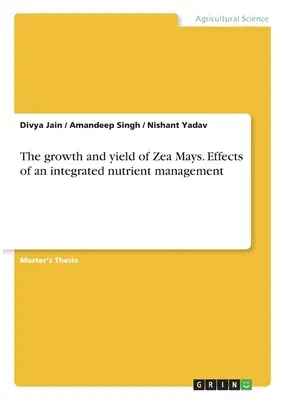Master's Thesis from the year 2018 in the subject Agrarian Studies,
grade: 8.5, course: Agronomy, language: English, abstract: The aim of
this study is to study the effect of integrated nutrient management on
the growth and yield of kharif Maize and to work out the economics of
different nutrient management treatments. As the chemical's fertilizers
play an important role in plants life so that these chemicals should not
be avoided completely as they are the potential sources of the high
amount of nutrients in easily available forms. These fertilizers greatly
affect enzymatic activities in the soil profile but poor management of
the chemical fertilizers has a key role in lowering the yield
productivity and deteriorate the soil health also. So, to achieve
optimum crop production, there is a need to use the combination of
organic sources, inorganic sources, bio-fertilizers. Maize (Zea mays L.)
requires the nutrients i.e., macronutrients as well as micronutrients
for obtaining the higher crop growth and yield. The micronutrients
content in organic manure may be sufficient to meet the crop requirement
but the low soil fertility is the major problem to maintain
sustainability in production. The application of organic manure do not
produce optimum yield due to low nutrient status but they play a direct
role in plant growth by the mineralization they provide the essential
nutrients which furthermore improves the physical and biological
properties of the soil. The use of organic plays an important role in
maintaining soil health due to the build-up of soil organic matter,
beneficial microbes. "Biofertilizer" is a substance that contains living
organisms. It promotes growth by increasing the supply or availability
of primary nutrients to the host plant. These are not fertilizers
because fertilizers directly increase soil fertility by adding
nutrients. They add nutrients through the natural processes of fixing
atmospheric nitrogen, solubilizing phosphorus, and stimulating


